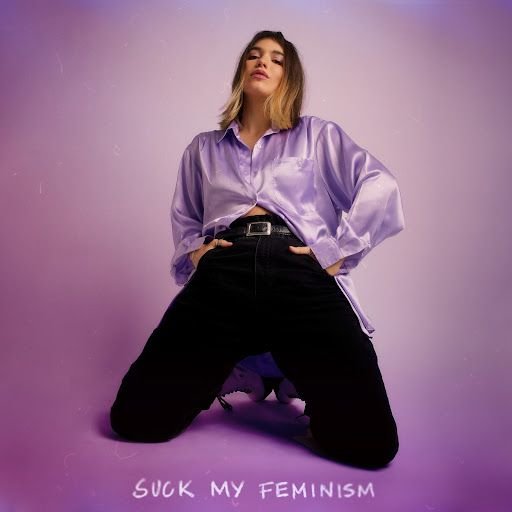Pop with Purpose in FLAVIA’s Latest

Image courtesy of FLAVIA.
FLAVIA writes, plays, and produces her own “pop with purpose” music. FLAVIA sat down with WHRB recently while traveling through Europe to discuss her most recent EP Suck My Feminism. In Suck My Feminism, FLAVIA discusses feminism, female empowerment, and “sticking it to gender norms and the patriarchy.”
This interview has been edited for length and clarity.
Can you introduce us to your new EP, Suck My Feminism?
FLAVIA: Yeah. This EP was uncomfortable to release every step of the way. But it was never supposed to be comfortable. My hope is that it will be healing for some, empower others, and help create a higher level of understanding and respect. Suck My Feminism is about female sexual liberation, it’s about my body and a woman’s right to choose, it’s about loss, about women getting to say whatever the f*ck they want in their music, speaking out and standing up for ourselves, and worshipping and respecting our bodies that literally give humans life. I hope this will help make a difference.
Why did you decide to combine music with activism?
F: I call it “pop with purpose.” I don’t see why we can’t make amazing music that people want to listen to and dance to, but also has a deeper message behind it than just “I’m in a club and popping bottles,” which is also cool!
I think what really gave me this desire is wanting to, in some small way, make a difference through my music, as well as making great music that people can enjoy – even if it's about a heavy topic.
Like my song “Suck My Feminism” is about many things, but largely it's about sexual harassment. That's a really heavy topic to listen to, but I think if you didn't know that, you can listen to the song and enjoy it for a really great song and for an interesting beat. You can move to it, and if you want to go deeper and listen to the lyrics and allow it to touch you, then it can.
Your song “Nameless” is definitely one of the heavier songs on the album. If you’re comfortable sharing, could you please tell us more about your inspiration for the song?
F: Yeah, absolutely. That one is really special to me. I went through an abortion when I was 19, and for so many years, I internalized that trauma and the pain and the shame and the guilt and I just – I sort of didn't, I didn't talk about it for so long.
I think as a society and as women, especially when we internalize our trauma, it only manifests in ways that we couldn't predict. It just becomes something that is always under the surface, that we don't deal with. Actually, the day that that song poured out of me, it was originally because of a scene in a show called Sex Education. There was something about this scene that triggered me.
There's just this collective understanding between females – even if you haven't been through this – of just like, what our bodies are capable of, and the pain that one might feel going through a loss like that – whether it was by choice or not. So yeah, that was the day that this song, in five minutes, came out. I haven't changed a word of it since. And since I wrote it sobbing at the piano, the initial voice note is, like, inaudible.
That was so important for me to get out, and it was so therapeutic. When I realized how much that song was able to help other people who had been through abortions – for whatever their own reasons – and when I started getting messages from people of how that was so instrumental in their grieving, processing, and their moving forward,
Any fear that I had of putting the song out – of what are people going to think, what's my family going to think, this is such a big secret of mine – opening it out, opening up to the world about it, and hearing people's reactions, that was all so meaningful. I think I had one troll. Which for a song like that is very, very shocking.
You mentioned the pull of “what will people think,” but also “this will help a lot of people.” What ultimately pushed you to finally release that personal story?
F: I think that's sort of just my mission statement as an artist. I know, maybe it sounds cheesy, but to heal your heart with my pain. I feel lucky enough that through my art, I am able to process my deepest, hardest, and also most beautiful moments.
There's never a doubt – I don't shy away from releasing songs that might be too personal or too difficult. I welcome the conversation around them.
You know those days when you're either having the best day or the worst day, and this song comes on, and you're like, “This stranger is speaking the exact things that I feel. I feel less alone now.” I hope that my music, in some way, makes someone feel less alone.
Listen to FLAVIA’s new EP Suck My Feminism out now.
// Lily Roberts ‘25 is a guest writer for The Darker Side.